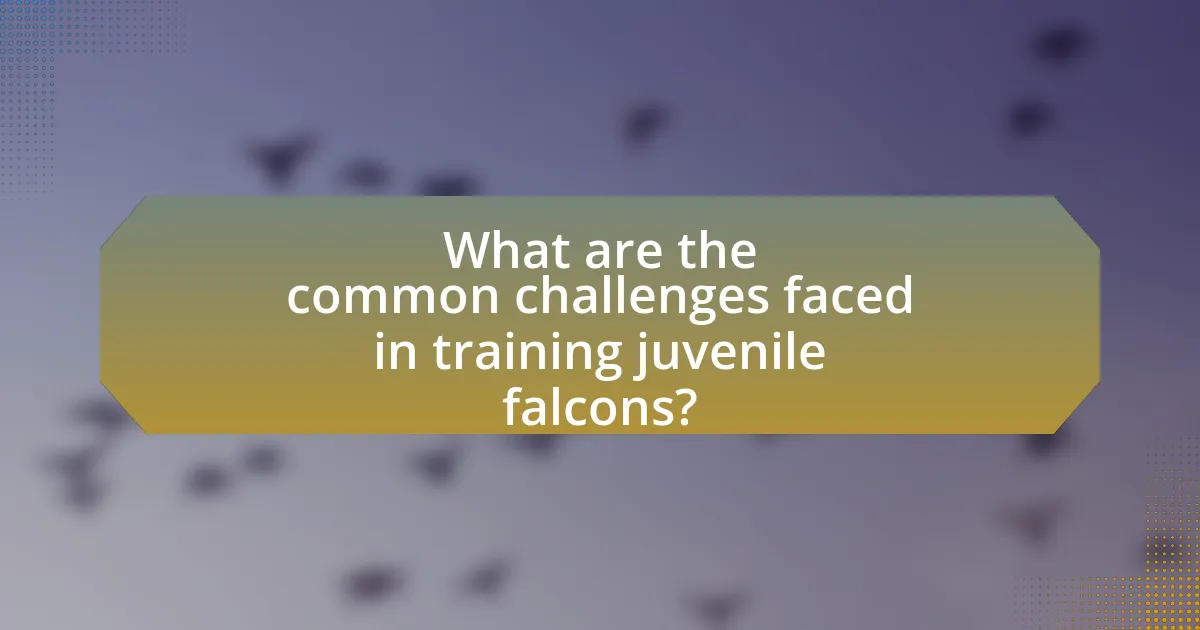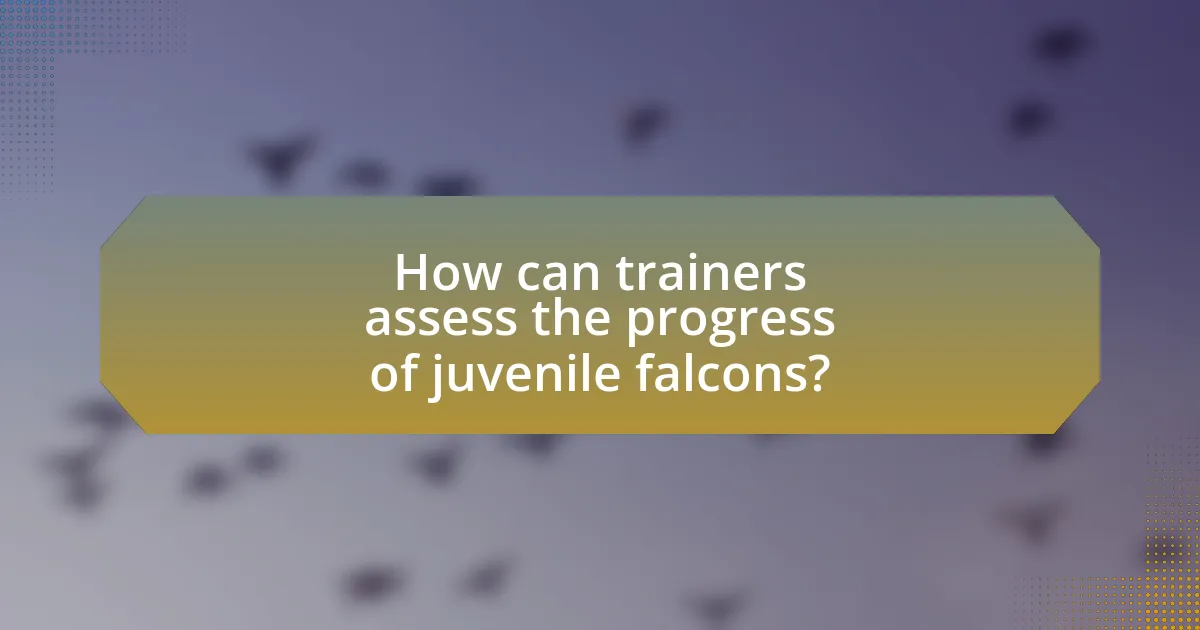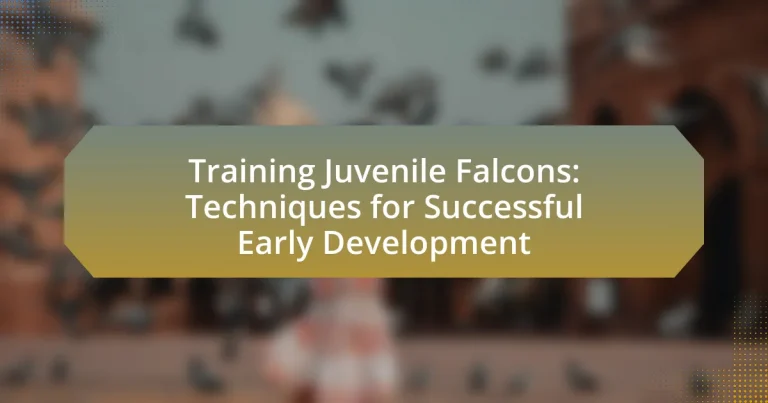The article focuses on the training of juvenile falcons, emphasizing techniques for successful early development. Key principles include establishing trust, consistent reinforcement, and gradual exposure to hunting scenarios, which are essential for building a strong bond between the trainer and the bird. The article discusses the impact of early development on future performance, the importance of socialization and habituation, and effective training techniques such as positive reinforcement. Additionally, it addresses common challenges trainers face, safety considerations, and best practices for ensuring the physical well-being of juvenile falcons, providing a comprehensive guide for trainers in the field of falconry.
What are the fundamental principles of training juvenile falcons?

The fundamental principles of training juvenile falcons include establishing trust, consistent reinforcement, and gradual exposure to hunting scenarios. Trust is built through regular, positive interactions, allowing the falcon to associate the trainer with safety and food. Consistent reinforcement, such as rewarding desired behaviors with food or praise, encourages the falcon to repeat those behaviors. Gradual exposure to hunting scenarios helps the juvenile falcon develop essential skills in a controlled manner, ensuring they are prepared for real hunting situations. These principles are supported by falconry practices that emphasize the importance of a strong bond between the trainer and the bird, which is crucial for effective training outcomes.
How does the early development of juvenile falcons impact their future performance?
The early development of juvenile falcons significantly influences their future performance in hunting and survival skills. During this critical period, factors such as nutrition, social interactions, and exposure to various environments shape their physical and behavioral traits. Research indicates that falcons raised in enriched environments, where they have access to diverse stimuli and social learning opportunities, exhibit enhanced hunting proficiency and adaptability compared to those raised in less stimulating conditions. For instance, studies have shown that juvenile peregrine falcons that engage in play and practice hunting techniques early on develop better coordination and success rates in capturing prey later in life.
What stages of development should trainers focus on during the training process?
Trainers should focus on the critical stages of socialization, habituation, and skill acquisition during the training process of juvenile falcons. Socialization involves exposing the falcon to various environments and stimuli to reduce fear and promote adaptability. Habituation is essential for getting the falcon accustomed to human presence and handling, which is crucial for successful training. Skill acquisition focuses on teaching the falcon specific behaviors and tasks, such as flying to the trainer or responding to commands. These stages are vital for ensuring the falcon develops the necessary skills and temperament for successful training and future hunting activities.
How do environmental factors influence the training of juvenile falcons?
Environmental factors significantly influence the training of juvenile falcons by affecting their behavior, learning processes, and adaptability. For instance, the availability of natural prey in the environment can enhance hunting skills, as juvenile falcons learn to associate specific cues with successful captures. Additionally, environmental conditions such as weather and habitat type impact the falcons’ physical conditioning and exposure to various stimuli, which are crucial for their development. Research indicates that falcons trained in diverse environments exhibit greater adaptability and improved hunting proficiency, as they encounter a wider range of challenges and experiences during their formative training stages.
What techniques are most effective for training juvenile falcons?
The most effective techniques for training juvenile falcons include positive reinforcement, consistent handling, and gradual exposure to hunting scenarios. Positive reinforcement, such as rewarding the falcon with food for desired behaviors, encourages learning and builds trust between the trainer and the bird. Consistent handling helps the juvenile falcon become accustomed to human interaction, which is crucial for its development and future training. Gradual exposure to hunting scenarios, including the use of live prey or lure training, allows the falcon to develop its natural hunting instincts in a controlled environment. These methods are supported by studies in falconry that emphasize the importance of building a strong bond and providing a structured training regimen for successful outcomes.
How can positive reinforcement be applied in falcon training?
Positive reinforcement can be applied in falcon training by rewarding desired behaviors with food, praise, or other incentives immediately after the behavior occurs. This method encourages juvenile falcons to repeat the behaviors that lead to positive outcomes, such as returning to the trainer or performing specific tasks. Research indicates that using positive reinforcement enhances learning and retention in birds, as it creates a strong association between the behavior and the reward, leading to more effective training sessions.
What role does socialization play in the training of juvenile falcons?
Socialization is crucial in the training of juvenile falcons as it helps them develop essential skills for hunting and interacting with their environment. Through socialization, young falcons learn from adult birds, which enhances their ability to recognize prey and understand social hierarchies within their species. Research indicates that juvenile falcons that are properly socialized exhibit improved hunting success rates and adaptability in various environments, as they are better equipped to mimic the behaviors of experienced adults. This learning process is vital for their survival and integration into the wild.
What are the common challenges faced in training juvenile falcons?

Common challenges faced in training juvenile falcons include establishing trust, managing their natural instincts, and ensuring consistent feeding schedules. Trust is crucial as juvenile falcons may initially be wary of human handlers, making it difficult to build a bond necessary for effective training. Additionally, their strong predatory instincts can lead to distractions during training sessions, complicating the learning process. Consistent feeding schedules are essential to maintain their focus and motivation, as irregular feeding can result in erratic behavior and decreased responsiveness to training cues. These challenges are well-documented in falconry literature, emphasizing the need for patience and adaptability in training methods.
How can trainers overcome behavioral issues in juvenile falcons?
Trainers can overcome behavioral issues in juvenile falcons by implementing consistent training routines and positive reinforcement techniques. Establishing a structured environment helps juvenile falcons understand expectations and reduces anxiety, which can lead to behavioral problems. Positive reinforcement, such as rewarding desired behaviors with food or praise, encourages the falcons to repeat those behaviors. Research indicates that consistent training methods improve the learning process in birds of prey, as they respond well to clear cues and rewards.
What specific behaviors should trainers be aware of during the training process?
Trainers should be aware of the juvenile falcons’ stress responses, attention spans, and social behaviors during the training process. Stress responses can manifest as vocalizations or avoidance behaviors, indicating discomfort or fear, which trainers must recognize to adjust their methods accordingly. Attention spans in juvenile falcons are typically short, requiring trainers to implement brief, engaging training sessions to maintain focus and facilitate learning. Additionally, social behaviors, such as interactions with other falcons or trainers, can influence a juvenile’s development; trainers should monitor these interactions to foster positive socialization and reduce aggression. Understanding these specific behaviors is crucial for effective training and successful early development of juvenile falcons.
How can trainers effectively manage stress in juvenile falcons?
Trainers can effectively manage stress in juvenile falcons by implementing a structured training routine that includes gradual exposure to stimuli, positive reinforcement, and ensuring a comfortable environment. Gradual exposure helps juvenile falcons acclimate to various situations without overwhelming them, reducing anxiety. Positive reinforcement, such as rewarding desired behaviors with food or praise, encourages confidence and reduces stress responses. Additionally, maintaining a comfortable environment with appropriate housing, temperature, and minimal disturbances supports the overall well-being of the falcons, further mitigating stress. These methods are supported by studies indicating that structured training and environmental stability are crucial for the psychological health of raptors during their developmental stages.
What safety considerations should be taken into account during training?
During training of juvenile falcons, safety considerations include ensuring a secure environment to prevent escapes and injuries. This involves using appropriate enclosures that are escape-proof and free from hazards such as sharp objects or toxic plants. Additionally, handlers must wear protective gear, such as gloves and eye protection, to prevent injuries from bites or talons. It is also crucial to monitor the health and stress levels of the birds, as excessive stress can lead to health complications. Proper training techniques should be employed to avoid causing fear or aggression in the falcons, which can result in dangerous situations for both the birds and the trainers.
How can trainers ensure the physical well-being of juvenile falcons?
Trainers can ensure the physical well-being of juvenile falcons by providing a balanced diet, regular exercise, and proper veterinary care. A balanced diet rich in proteins, vitamins, and minerals is essential for their growth and development, as juvenile falcons require specific nutrients to support their rapid physical changes. Regular exercise, including flight training and hunting simulations, helps develop their muscles and coordination, which are crucial for their survival skills. Additionally, routine veterinary check-ups are vital to monitor their health, prevent diseases, and address any physical issues early on. These practices are supported by avian health studies that emphasize the importance of nutrition and exercise in the development of raptors.
What precautions should be in place to prevent accidents during training?
To prevent accidents during the training of juvenile falcons, it is essential to implement safety measures such as using appropriate equipment, ensuring a controlled environment, and providing proper supervision. Utilizing specialized falconry gear, like gloves and hoods, minimizes the risk of injury to both the trainer and the bird. A controlled environment, free from distractions and hazards, allows for focused training sessions, reducing the likelihood of accidents. Additionally, having experienced trainers present ensures that any potential risks are promptly addressed, enhancing safety during the training process.
How can trainers assess the progress of juvenile falcons?

Trainers can assess the progress of juvenile falcons through a combination of behavioral observations, flight performance evaluations, and health assessments. Behavioral observations involve monitoring the falcons’ responses to training cues, their ability to follow commands, and their social interactions with trainers and other birds. Flight performance evaluations include measuring the distance and accuracy of their flights during training sessions, which indicates their physical development and flying skills. Health assessments involve regular veterinary check-ups to ensure the falcons are physically fit and free from illness, as health directly impacts their training progress. These methods provide a comprehensive understanding of a juvenile falcon’s development and readiness for advanced training.
What metrics can be used to evaluate the training effectiveness?
Metrics used to evaluate training effectiveness include retention rates, skill acquisition, behavioral changes, and performance assessments. Retention rates measure how much information or skills participants retain over time, indicating the long-term impact of training. Skill acquisition assesses the degree to which participants can demonstrate newly learned skills, providing insight into immediate training outcomes. Behavioral changes reflect the application of skills in real-world scenarios, showcasing the practical effectiveness of training. Performance assessments, often through standardized tests or evaluations, quantify the level of proficiency achieved post-training. These metrics collectively provide a comprehensive view of training effectiveness in the context of juvenile falcon development.
How often should trainers conduct assessments of juvenile falcons?
Trainers should conduct assessments of juvenile falcons every two to four weeks. This frequency allows trainers to monitor the birds’ development, health, and training progress effectively. Regular assessments help identify any issues early, ensuring that the juvenile falcons receive appropriate care and training adjustments as needed. Studies in avian training emphasize the importance of consistent evaluations to optimize the learning process and overall well-being of the birds.
What signs indicate that a juvenile falcon is ready for advanced training?
Juvenile falcons are ready for advanced training when they exhibit strong hunting instincts, increased physical strength, and the ability to respond to basic commands. These signs indicate that the falcon has developed the necessary skills and confidence to progress. Specifically, a juvenile falcon showing consistent interest in prey, demonstrating agility in flight, and successfully completing basic tasks such as following the trainer or returning to a perch are clear indicators of readiness for more complex training.
What resources are available for trainers of juvenile falcons?
Trainers of juvenile falcons have access to various resources, including specialized training manuals, online courses, and mentorship programs. These resources provide essential techniques and knowledge for effective training. For instance, the book “Falconry: The Essential Guide to Training and Hunting with Falcons” offers comprehensive insights into falcon training methods. Additionally, organizations like the North American Falconers Association provide workshops and networking opportunities for trainers to learn from experienced falconers. Online platforms such as the Falconry Academy offer courses that cover both theoretical and practical aspects of falcon training, ensuring trainers are well-equipped to develop juvenile falcons successfully.
How can trainers find mentorship or guidance in falcon training?
Trainers can find mentorship or guidance in falcon training by connecting with experienced falconers through local falconry clubs or associations. These organizations often provide resources, workshops, and networking opportunities that facilitate mentorship. For example, the North American Falconers Association offers a mentorship program that pairs novice falconers with seasoned professionals, ensuring that trainers receive practical advice and support tailored to their specific needs in training juvenile falcons.
What literature or online resources are recommended for further learning?
Recommended literature for further learning on training juvenile falcons includes “The Falconer’s Apprentice” by John W. W. McGowan, which provides comprehensive insights into falconry techniques and juvenile training methods. Additionally, “Hunting with Hawks” by John W. W. McGowan offers practical guidance on the training process and behavioral understanding of juvenile falcons. Online resources such as the North American Falconers Association (NAFA) website provide valuable articles, forums, and community support for falconers seeking to enhance their knowledge and skills in juvenile falcon training. These sources are recognized within the falconry community for their authoritative content and practical applications.
What are the best practices for successful early development of juvenile falcons?
The best practices for successful early development of juvenile falcons include providing a balanced diet, ensuring proper socialization, and implementing consistent training routines. A balanced diet rich in proteins and vitamins is crucial for their growth and health, as it supports their physical development and energy levels. Socialization with both humans and other birds fosters adaptability and reduces stress, which is essential for their overall well-being. Consistent training routines, utilizing positive reinforcement techniques, help establish trust and encourage desired behaviors, leading to more effective training outcomes. These practices are supported by avian research indicating that nutrition, social interaction, and structured training significantly influence the development and behavior of juvenile raptors.
How can trainers create a structured training plan for juvenile falcons?
Trainers can create a structured training plan for juvenile falcons by establishing clear objectives, implementing a gradual training schedule, and incorporating consistent reinforcement techniques. First, trainers should define specific goals, such as improving flight skills, hunting instincts, or socialization. Next, a training schedule should be developed that outlines daily or weekly activities, ensuring that each session builds on the previous one to promote skill progression. Additionally, trainers must use positive reinforcement, such as rewards or praise, to encourage desired behaviors, which has been shown to enhance learning in birds. This structured approach allows for systematic development and adaptation based on the falcon’s individual progress and needs.
What tips can enhance the training experience for both trainers and juvenile falcons?
To enhance the training experience for both trainers and juvenile falcons, establishing a consistent routine is essential. A structured schedule helps juvenile falcons adapt to training sessions, making them more receptive to learning. Additionally, using positive reinforcement techniques, such as rewards for desired behaviors, fosters a trusting relationship between the trainer and the falcon. Research indicates that positive reinforcement significantly improves learning outcomes in avian species, as it encourages repeat behaviors. Furthermore, ensuring a calm and distraction-free environment during training sessions allows juvenile falcons to focus better, leading to more effective learning.


